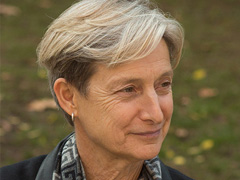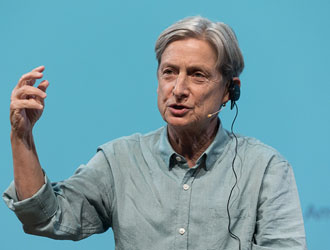The well-known gender theorist and professor of linguistics at the University of California, Berkeley offers her views on public space today and on the dwindling freedom of assembly.
Shared Spaces recorded this conversation with Judith Butler on 5 November 2015 when she visited the Centre of Contemporary Culture of Catalonia (CCCB) to give the lecture “Bodies That Still Matter”, which was programmed as part of the “Human+” exhibition and in which she spoke about the immediate future that awaits our species.
In response to the question about what she thinks about the current situation of public space, she mentions privatisation, warning that being able to use a place as “public space where anyone can go, or where groups can assemble, either in informal associations or in public assemblies, is harder and harder to do”. She gives “Occupy Gezi” in Istanbul as an example, noting that, when this iconic space of political movements and representations was sold to private industry, many people took it as a great offence while also recognising “that their democracy was in some sense in peril if they didn’t have the public space in which to assemble”. She concludes with a strong statement: “the more public spaces privatised, the less freedom of assembly there is, and I’m not sure you can have a democracy without freedom of assembly”.
As for her favourite public space, Butler refers to the public swimming pool she frequents, a facility that since it is – physically and economically – open to everyone, she values for what it signifies in democratic and egalitarian terms. Some people use it as a place where they can shower and others for swimming and, in general, it is a place of diversity where different groups can meet and be in contact. Butler laments that other similar places have been closed as an austerity measure, saying that she feels as if she is a member of an anonymous public at the pool. “We are many ages, we are many sizes […]. I don’t know the names of any of these people […] and we are trying to live out our bodily lives in the ways we can. And it makes me in a daily way appreciate public sphere.”




